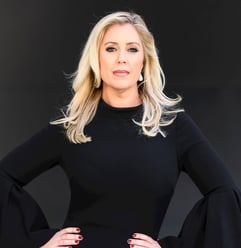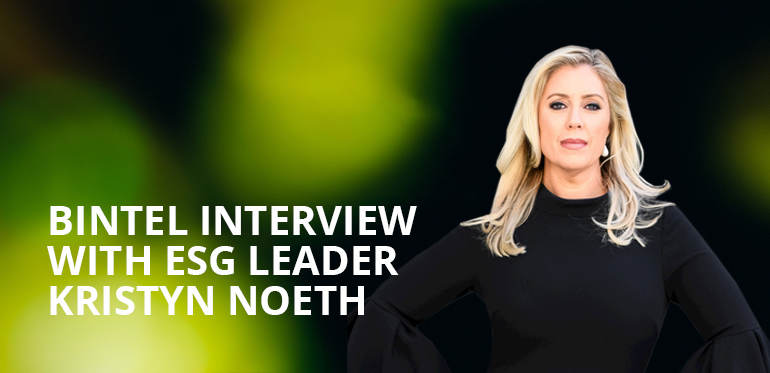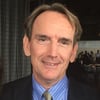Bintel Interview with Kristyn Noeth
This is the first of our series of interviews with leaders in ESG and Sustainability. Our interview with Kristyn was March 30, 2023 and the transcript has been edited to fit this format. We were fortunate to have Kristyn lead off in this interview series and know you'll find her insight valuable.
 Kristyn Noeth
Kristyn Noeth
President, Verde Impact LLC
Kristyn is a highly accomplished and respected leader in the climate, sustainability, and ESG (Environmental Social Governance) fields, with more than 25 years of experience in leadership positions in global corporations, charitable organizations, and the White House. In her current role as the President of Verde Impact LLC, she provides consulting and advisory services in ESG and sustainability to organizations and companies of all sizes. Additionally, she serves as an ESG and sustainability advisor for Ted Danson's popular television show and is an avid public speaker, providing insights and valuable perspectives on various topics such as board diversity, climate change, and the clean energy transition. Aside from her professional career, Kristyn also actively engages in pro bono work and various causes, including advancing women in leadership at Chief, Ellevate and the Female Founder Collective, and capacity building and good governance for charitable organizations. She holds a number of degrees, including a Juris Doctor from Georgetown Law and Bachelor’s and Master’s degrees in Urban & Environmental Planning and Public Policy from the University of Virginia, among others. Her wealth of knowledge and experience in the ESG and sustainability fields make her a highly sought-after professional and invaluable asset to any organization or initiative.
-----
Tom: Thank you for spending some time with us today. You have an awesome background, but before we get into what’s going on in ESG today, how did you get started?
Kristyn: I chose my college major of Urban & Environmental Planning with a concentration in Public Policy as I wanted to better understand how people live and how we shape communities through infrastructure, access, and all the social and environmental issues that I saw in the world. Some of my professors were just beginning to look at sustainable development and the impact we were having as an industrial society on the earth and our human systems. I took the first courses offered in sustainability at the college level. That was eye-opening for me. It kind of went from there and for a long time, sustainability has been limited and siloed. But, we've seen such a big shift in the last few years, and people are going back to the beginning of the sustainability movement to understand what's happening now. It's just night and day.
Tom: That's interesting. The world is infinitely more complex now, but those early values don’t leave you. So that's cool, you were already committed to the law, so you pursued it from that direction. Was it a deliberate choice relative to sustainability?
Kristyn: Yes, that was true for my undergrad certainly, which was when I built my first sustainability plan. It was the public policy piece that I saw at the time, that had the most direct hand in shaping our communities, state and federal policy, and international policy on climate. I got my master’s and once I finished, I became a Presidential Management Fellow when the Clinton administration was in the White House. I was posted at the State Department to work on the Kyoto Protocol, which was the first big climate protocol treaty out of the UN, ultimately not signed by the United States.
But, we really pushed on that one, working across the government, internationally, and with so many companies while I attended law school in the evening. I knew I wanted to go to law school to supplement what I knew. I took classes in the evening sessions, so it allowed me to keep doing this work. I was 23, and like a lot of very young people in Washington, you're in a lot of meeting rooms on important issues and you’re there to work very hard. The opportunity, exposure, and experience are just incredible. So that was a good time for me. I didn’t sleep much during those years, but it was worth it. I couldn't do it now!
Tom: How have things changed since you started regarding the priorities and the kind of work people are doing? What are the problems and opportunities today from your perspective?
Kristyn: You know I began this work with an empaneled governmental team on climate change to look at climate, science, impacts, and what was forecasted. Now, 30 years later, the IPCC has released its sixth-assessment report and that group has been warning, just as the leading climate scientists in the world have been warning us on what is happening with the planet's temperature and the impacts. And, back then, the science was still disputed quite often. Now, there's more consensus on the science and we know what emissions are doing to our ecological systems. But, the challenges still exist, such as how do we get cogent regulation and legislation passed? And, I do think that the market speaks for itself. People want to buy into a socially responsible company, that treats its workers well, that's good for the environment, and lives its values of diversity, equity and inclusion.
Tom: I’m wondering if there is receptivity to the negative news around ESG in the boardroom? Some are blaming the SVB failure on ESG. Are boards caving to some of this pressure?
Kristyn: No, I think market-leading companies are focused on sustainability and certainly all the social dimensions, as well. You know metrics and goals are now baked into a company's strategy, and that's smart. It enables the C-suite and the board to keep moving forward on those topics even though the demographics of corporate leadership don’t reflect our world.
Tom: Good observation. I think about that in the context of the ESG debates. There is a disconnect between the values of the younger workforce and company leadership. Do you agree?
Kristyn: It's true. In terms of gender and pay equity, we've slipped and haven't made the progress that we think we have when we look at a lot of the metrics. We have a lot of work to do, and the leading voices understand that. I do think that some leaders think meeting certain metrics is satisfactory and that's where we must have those conversations. We need to raise the bar and figure out what we're doing on a micro level, not just the macro level. We need more women and people of color, more individuals with diverse economic backgrounds in leadership. I think leaders look at policies and they're looking at their numbers, but they may not be looking at causes of attrition. They may not be looking at some of the programs or taking a holistic approach. It's an ongoing conversation because we are nowhere where we need to be.
Tom: I want to ask you about that. In looking at the conversations with chief sustainability officers, what I've found interesting is that it seems to be predominantly women. Is that observation accurate in your opinion, and is there a reason for it?
Kristyn: Without having looked at the numbers, in my experience, I would say it's predominantly women. There has always been a failing of gender diversity on the board and in the C-suite. Typically, the C-suite roles, the ones that are given to women, tend to be in external relations, human resources, public relations, or marketing. Many of those roles are relationship driven. It intuitively makes sense to me that women excel in those roles. You might have two women out of 12 C-suite officers. You rarely see women serving as a CEO or the president of a business.
I was told for years that sustainability, as well as social impact and corporate social responsibility, is the soft stuff. You know the friendly stuff. As those are not revenue-producing roles, it's certainly a cost center, and it's been viewed as nice to have in a lot of ways, at least on a broad scale.
Tom: Sustainability itself doesn't seem to be a relationship position. I mean there's a lot of hard science involved, supply chains, etc., but are women finding opportunities there because men don't want those jobs, or do women just care more about the issues?
Kristyn: I don't know the answer to the gender question. Within companies, the sustainability role is split. It's an internal-facing role and an external-facing role. The internal piece is engineering and science and data collection, and you’re working across every business unit at the company. It's as if you're the hub with spokes working within a big global company. You must be able to build those relationships and coalitions internally and externally with stakeholders to support the sustainability strategy.
Tom: Are you seeing most of the activity from a large sort of 500 publicly held crowd, medium to smaller companies, or is there anything you can say about the distribution of the work that's going on out there across these different sized organizations?
Kristyn: It’s across all sectors and industries, and public and private companies. We have global, large, capitalized companies, and publicly traded companies, and a lot of them have been reporting and focused on sustainability for a long time. Certainly, companies for instance in the energy sector. Anybody that has manufacturing, or a supply chain is focused on sustainability efforts and sustainability is baked into product development. Public companies have been required to report on material climate risks since 2010, so there's been some focus on it from a compliance, risk, and audit perspective.
What you see now is many smaller companies from inception, focusing on this space entirely in their product design: how do we make a better sneaker, and how do we leave the planet in as good, or better shape than before we made that sneaker? I think some of that is generational, too, and not necessarily an afterthought. It's part of the strategy and product design, and I think that's fantastic. We need this type of thinking if we're going to be in any position to reach our climate goals in the Paris Agreement.
Tom: Do you think that the predominant driver in the market over the next couple of years is going to be compliance and regulatory, specifically or in many cases coming out of Europe? Who is a bit ahead of us or leading the charge?
Kristyn: Europe definitely and certain parts of Asia are ahead of us on sustainability-linked reporting requirements. We were expecting the SEC to issue a final climate disclosure rule in April of this year, which will very much change the dynamic of how companies are possibly collecting and reporting, and from a compliance and audit perspective here in the U.S.
Tom: Do you think COVID has had any effect on the impact of these disruptions in supply chain resiliency for these companies?
Kristyn: The supply chain is a huge factor in sustainability, as the transportation sector alone accounts for a third of all greenhouse gas emissions. How do you ship, track, and move things when you know demand continues to increase? In the last couple of years, the Administration has passed several executive orders that have put regulations in place to clean up the supply chain and improve our infrastructure. I think we need to do that on a large scale to see both sustainability improvements in the supply chain and efficiency improvements. That’s a huge problem on a global scale for sure.
The pandemic certainly brought that into focus a lot of other aspects of sustainability, as well. When you think about health and wellness, I think a lot of companies may have been doing a box-checking exercise for a long time. I think we look at that differently now. If people are sick, they should stay home and take care of themselves and not expose others. The mentality of supporting and caring for our employees and their families has become more of a priority where it might not have been before, at least here in the US.
Tom: It’s fascinating how the social in ESG has overlapped with the environment in ESG. Where do you think this is going in terms of the market and the ecosystem of companies that are trying to help solve these problems? Bintel has little ability to reduce our carbon footprint so we're trying to help other people. Where do you think the strongest opportunities exist for a smaller organization whose mission is helping people that want to do the right thing?
Kristyn: In my opinion, it's two things and it’s how I try to act, as well. Your organization needs to reflect your values and work to operate that way. My recommendation is to lead by example, which is what I try to do. I think smaller organizations may think they’re only, 15 or 20, or 30 people, with minimal impact. I think everybody has an impact on their community and has a responsibility to do what they can. I love to hear about the work you're doing and that the mission and values haven't had to change because you set them right in the first place.
The second thing is asking, “how can I have the best impact?” Every group has a certain skill set or certain ability and can replicate wins in a certain area of the world or within a certain industry. I think that there must be a through line. Where and how are we going to have the most impact? That's what I always think about, the how. How can I have more impact with what I'm doing or saying? And sometimes that occurs on a smaller scale than the larger one, but I think that it's incumbent on all of us. We have a lot to do and that’s what we are focusing on at Verde Impact as we advise our clients on how best to advance their sustainability and ESG goals.
Tom: The old saying to “think global and act local” is fundamental to this challenge as we can have more impact locally to act on problems and connect with people. This has been a very thoughtful and wonderful conversation. I hope we can figure out how to work together and make some progress on this huge problem.
Kristyn: Yes, thank you so much, I agree and hope so, too. I enjoyed our conversations. I think we have a similar outlook, and you know we both want to make an impact.
Tom: Thanks again.


